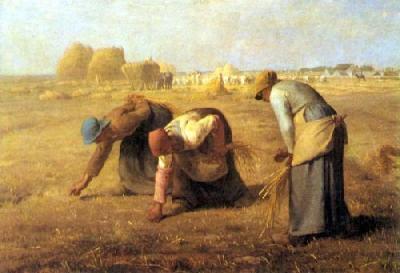
Jean-Francois Millet, The Gleaners
In Southern Maryland our eternal summer appears finally to be fading and the fall, my favorite season, is a’cumin in. To celebrate it, I am posting one of my favorite seasonal poems, John Keats’ “To Autumn” (1817).
The poem takes on added significance as the news continues to get worse for my friend Alan. Despite starting a program of chemotherapy, he has just learned that his cancer has spread from his liver to his vertebrae. Our plans to visit him Sunday evening were canceled because of his fatigue.
Perhaps Keats is able to capture the richness of the season because he himself was familiar with death and would die himself four years later. Winter may be approaching, gathering swallows may twitter in the skies, but that just makes us appreciate all the more what is left of life. In one last burst of plenitude, apples bend the branches, the gourd swells, and bees are glutted with the final pollen of the season. Our time may be draining away, but as a result the final oozings of the cider press enthrall us for hours. Here’s the poem:
SEASON of mists and mellow fruitfulness,
Close bosom-friend of the maturing sun;
Conspiring with him how to load and bless
With fruit the vines that round the thatch-eves run;
To bend with apples the moss’d cottage-trees,
And fill all fruit with ripeness to the core;
To swell the gourd, and plump the hazel shells
With a sweet kernel; to set budding more,
And still more, later flowers for the bees,
Until they think warm days will never cease,
For Summer has o’er-brimm’d their clammy cells.
Who hath not seen thee oft amid thy store?
Sometimes whoever seeks abroad may find
Thee sitting careless on a granary floor,
Thy hair soft-lifted by the winnowing wind;
Or on a half-reap’d furrow sound asleep,
Drows’d with the fume of poppies, while thy hook
Spares the next swath and all its twined flowers:
And sometimes like a gleaner thou dost keep
Steady thy laden head across a brook;
Or by a cyder-press, with patient look,
Thou watchest the last oozings hours by hours.
Where are the songs of Spring? Ay, where are they?
Think not of them, thou hast thy music too,—
While barred clouds bloom the soft-dying day,
And touch the stubble plains with rosy hue;
Then in a wailful choir the small gnats mourn
Among the river sallows, borne aloft
Or sinking as the light wind lives or dies;
And full-grown lambs loud bleat from hilly bourn;
Hedge-crickets sing; and now with treble soft
The red-breast whistles from a garden-croft;
And gathering swallows twitter in the skies.

